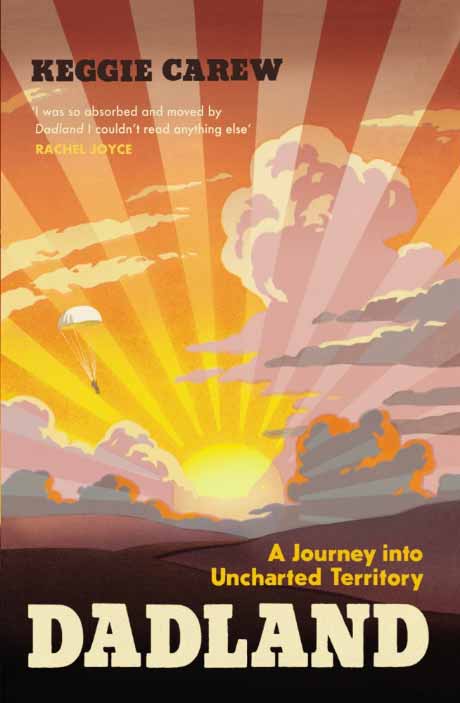
Front cover of ‘Dadland’
I don’t usually devote the whole blog to a single book, but this one really is something special. ‘Dadland‘ by Keggie Carew is an amazing read: touching, absorbing and altogether the kind of book I love and press (no doubt irritatingly) onto friends and family – and now you, dear reader.
This is why I buy paper books, so you can pass copies on while your own enthusiasm is still white hot. While you can send a handy link or encourage friends to download a copy of your latest crush, in practice they never get round to it. But if you hand over a paper copy, common politeness demands that the recipient at least skim through a few pages and then if your recommendation is sound they will be hooked just as you were. And the cycle continues.
‘Dadland’ is a father-daughter story, a tragedy of descent into senility, a quest to connect and – most importantly for family historians – an almost perfect example of how a personal family story, told well, can resonate and reach a wider audience. Keggie’s father Tom was a Jedburgh, a maverick Special Operations Executive operative whose wartime ingenuity and heroism lost its purpose in peacetime, leaving him foundering. He couldn’t settle and the family fractured. Tom moved on, married again and lost the connection with his children. When his second wife, the much-resented stepmother, dies, Keggie sees an opportunity to reconnect with her father. But he is no longer the man he was; he is descending into Alzheimer’s. The dashing Irish colonel who blew up Gestapo railway depots, the ‘Lawrence of Burma’ who worked with guerrillas in the Burmese jungle, is now reduced to carrying slips of paper to remind himself of his own name. What she can do however is connect with his past and use this as a bridge between them:
‘…as dad slowly leaves us , I try to haul him back-from the bottom of cardboard boxes and forgotten trunks; from letters buried in desks; from books I previously had not known about; from photographs I am unfamiliar with; from diaries never meant for my eyes… I don’t know why I’ve taken on this task… except that suddenly I need to make some sense of it all. It’s not just dad I want to stick back together again. This is an exorcism. And a ghost hunt. Rebuild him. Rebuild me.’
I understand why Keggie turns to Tom’s past when the present is collapsing. Knowledge is power, facts are balm, they can be marshalled, organised, checked and double-checked. Although they are interpreted the interpreter has control, unlike Keggie’s reality where she does not know how to cope with her increasingly incapable and infuriating father who lives in a shed and can’t be trusted to remember to eat. You cannot spell check real life.
‘Dadland’ alternates between the story of Tom’s past, carefully researched and rich in detail, and the heartbreaking present of caring for an old, and increasingly ill, loved parent. It conveys the pathos of resentment warring with love, irritation and flashes of connection which will be so familiar to anyone who has cared for an elderly relative. Her research is that mix of painstaking slog through records (some of it here at Kew!) and leads, enlivened by occasional flashes of serendipity which is business as usual for the committed family historian.
One of the things I loved about this book was the very real humanity of the people involved. They are far from perfect, in fact this is a seriously dysfunctional family, but they are remarkable. Tom is a hero to Keggie of course, but Tom Carew was by all accounts an amazing person and his adventures as uncovered by his daughters will enthrall and amaze. Keggie herself carries a huge burden of resentment against her stepmother and reading of this I was reminded of the similar transference exhibited in Nigel Slater’s memoir Taste, where his emotional reaction to his stepmother is almost too extreme, carrying as it does all the suppressed resentment he can’t bring himself to direct at his father.
‘Dadland’, like all great reads, delivers on so many levels and will be different for different readers. The family historian will take one story, the military historian another and there is yet more for the carer balancing love and resentment whilst fighting back tears. Read it and see what story it gives you.
If when you finish this inspires you to look to your own parent’s past and you are thinking of writing up your family story look at ‘Writing Your Family History‘ by Gill Blanchard which is a great resource for those hoping to pull those hours of research and piles of papers into a meaningful product.
[…] techadmin on August 16, 2016 A journey into a father’s past2016-08-16T08:15:32+00:00 – Journals & Publications – No […]
If it helps Tom’s SOE file is HS 9/268/5 which is available (open) at Kew.